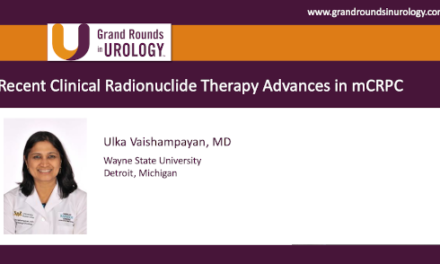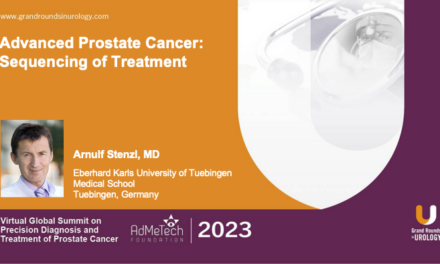Mark Emberton, MD, FRCS, presented “The Modern (Overlapping) Relationship Between Active Surveillance and Focal Therapy” during the 7th Global Summit on Precision Diagnosis and Treatment of Prostate Cancer on September 23, 2023.
This content is available free to the GRU Community. Login or create an account to view it.
How to cite: Emberton, Mark. “The Modern (Overlapping) Relationship Between Active Surveillance and Focal Therapy.” September 23, 2023. Accessed Jun 2025. https://grandroundsinurology.com/the-modern-overlapping-relationship-between-active-surveillance-and-focal-therapy/
The Modern (Overlapping) Relationship Between Active Surveillance and Focal Therapy – Summary
Mark Emberton, MD, FRCS, discusses the overlap between active surveillance and focal therapy in modern prostate cancer treatment. He begins by arguing that the proliferation of MRIs, which can accurately identify previously non-visible lesions, makes active surveillance unviable as a default treatment, emphasizing the survival rates of patients on active surveillance.
Dr. Emberton then presents an example case of a patient presenting with a lesion and the options physicians have for treatment. He compares the risks and benefits of treating the patient with focal therapy or monitoring the patient with active surveillance.
Dr. Emberton concludes by addressing the role of patient choice in prostate cancer treatment. He notes that informed patients tend to prefer therapy over surveillance, with little to no long-term regret about the decision. Patients opting for active surveillance over focal treatment tend to regret their decision not to treat the lesion earlier.
The Global Summit on Precision Diagnosis and Treatment of Prostate Cancer is a unique multi-disciplinary forum organized to inform the key health care stakeholders about the emerging advances in clinical case and research and create a consensus-based vision for the future of precision care and educational and research strategy for its realization. The mission of the Summit is to fill the currently existing gap between the key experts of in vivo imaging, the world authorities in the in vitro fluid- and tissue-based molecular diagnostics, including genomics, and thought leaders in the development of novel observation strategies (e.g., active surveillance, or AS) and therapeutic interventions.
ABOUT THE AUTHOR
Mark Emberton, MD, FRCS, is Professor of Interventional Oncology at the University College London. He is an Honorary Consultant Urologist at University College Hospitals NHS Foundation Trust and Founding Pioneer of The Charity Prostate Cancer UK. He was appointed Dean of UCL Faculty of Medical Sciences in 2015.
Professor Emberton’s clinical research is aimed at improving the diagnostic and risk stratification tools and treatment strategies for prostate cancer (PCa). He specializes in the implementation of new imaging techniques, nanotechnologies, bio-engineering materials and non-invasive treatment approaches, such as high intensity focused ultrasound and photo-dynamic therapy.
His research has been published in over 300 peer-reviewed scientific papers in journals including BMJ, Lancet Oncology and European Urology. He has also contributed to the development of guidelines for the management of PCa and lower urinary tract symptoms, published by the International Society of Geriatric Oncology and the European Association of Urology.
Professor Emberton is also involved in teaching within UCL and the London and South East Urological Training scheme. In addition to being a member of various urological and medical organisations (American Association of GenitoUrinary Surgeons, British Association of Urological Surgeons, European Association of Urology). He is a founding partner of London Urology Associates.




